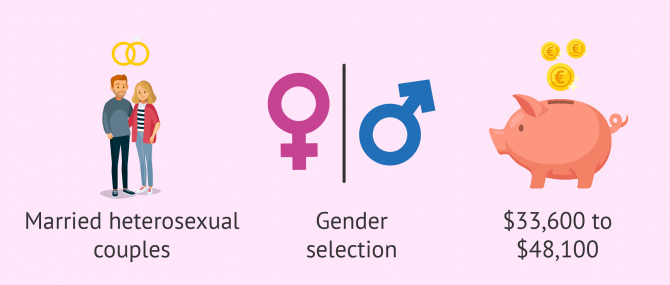Surrogacy is not a legal procedure in all countries, which leaves intended parents no alternative but to travel somewhere else, to countries with a well-defined legal framework that governs this infertility treatment.
Each destination country has its pros and cons, which should be considered very carefully before making up your mind.
What follows is a comprehensive guide to the main destination countries for undergoing surrogacy abroad. It should be noted that this list only includes those countries where surrogacy is allowed to international patients by law.
Provided below is an index with the 9 points we are going to expand on in this article.
- 1.
- 1.1.
- 1.2.
- 1.3.
- 1.4.
- 1.5.
- 2.
- 2.1.
- 2.2.
- 3.
- 3.1.
- 3.2.
- 4.
- 4.1.
- 4.2.
- 5.
- 5.1.
- 5.2.
- 5.3.
- 6.
- 6.1.
- 6.2.
- 7.
- 8.
- 8.1.
- 8.2.
- 8.3.
- 8.4.
- 8.5.
- 8.6.
- 9.
United States
The first thing to keep in mind before choosing the USA as our destination country for surrogacy is that there is no federal law that governs surrogacy arrangements across the country, but it varies by state. For this reason, our advice is that you pay special attention to the legality of this treatment in the US state of your choice according to your family type.
States where surrogacy is allowed
Currently, surrogacy arrangements are legal in the following territories: Nevada, California, Texas, Arkansas, Illinois, Virginia, Florida, New Hampshire, Delaware, New Jersey, Tennessee, and Utah.
Surrogacy-friendly states
By surrogacy-friendly states we refer to those US states where no law governs surrogacy arrangements currently, but case law indicates that courts are usually favorable to their performance. We recommend that you pay special attention when doing it in one of these states, as the risk for complications to arise is higher. Alaska, Georgia, Colorado, Idaho, North Carolina, Minnesota, Maryland, Montana, New Mexico, North Dakota, Rhode Island, Wyoming and Washington are included in this group.
States where surrogacy is not allowed
Those states that have not been mentioned in none of the sections listed above are the ones that ban surrogacy arrangements, including Arizona, Michigan, New York, Indiana, Kansas, Louisiana, and Nebraska. Surrogacy is even considered a criminal offence in some of them.
Legal parentage
The US states classified into the first and the second groups grant either post- or pre-birth orders to establish the parental rights of intended parents. They are key items when undergoing surrogacy in the USA.
In the USA, a birth order is the legal document used to assign parentage to a child.
The function of pre- and post-birth orders is the same, but differs in the moment when each is issued. So, while pre-birth orders can be started in the fourth month of pregnancy, post-birth orders are granted on day 3 or 5 following birth.
How much does it cost?
Perhaps the main disadvantage of the USA as a destination country for surrogacy overseas is the high cost of this treatment there, which ranges from $95,000 to $290,000 (£72,000 to £220,000). The fact that the US healthcare system is run by private businesses contributes to this.
Canada
Canada is a valid destination for all kinds of family structures as well: opposite-sex couples, same-sex couples, and single parents. What's more, legal parenthood is determined by a court ruling, which makes the process easier for intended parents.
Main characteristics
Only altruistic surrogacy arrangements are allowed in Canada. This means that the only pay given to surrogates is a reimbursement for the expenses incurred during pregnancy. Also, intermediaries cannot accept any kind of financial compensation for their services.
On the other hand, the main disadvantage of this destination is that, given the impossibility of compensating the surrogate financially, finding a surrogate can be difficult. This forces intended parents to be on a waiting list for Canadian surrogates.
How much does it cost?
The fact that the Canadian healthcare system is publicly funded and surrogates do not receive any kind of payment makes the price lower than in the USA. It can range from $55,000 to $72,000 (from £42,000 to £55,000).
Russia
In Russia, surrogacy is allowed only to straight couples and single females, as long as they they provide a medical certificate that proves their inability to carry a pregnancy to term.
Legal parentage
Firstly, one should take into account that, even though the Russian law permits it, single females have to be very careful when choosing Russia as their destination country for a surrogacy arrangement, as legal parentage might not be assigned to them in their country of origin.
There would be, however, no problem for intended mothers from the USA who want to become single mothers by choice, provided that they are able to use their own egg cells.
How much does it cost?
Russia is cheaper than other countries, as the cost of surrogacy there varies from $42,000 to $54,000 (from £32,000 to £41,000).
Ukraine
The situation of surrogacy in Ukraine is quite similar to that of Russia, yet it is regulated with an even stricter law—only married heterosexual couples have access to this fertility treatment.
Moreover, the intended mother must prove that there is a medical reason behind the need for a surrogate pregnancy, preventing her from either getting pregnant or carrying a pregnancy to term.
Main characteristics
In the case of US intended parents, as long as at least one of them contributes the genetic load, there will be no problem when applying for the child's US passport.
An advantage of Ukraine is that we can choose a family member or a friend as our egg donor. Unless is not a relative or a friend, the donor must remain anonymous by law. Moreover, gender selection through PGD (preimplantation genetic diagnosis) is permitted. Surrogates cannot claim maternity rights even if they wanted to following birth.
How much does it cost?
In Ukraine, the cost of surrogacy is $33,600-$48,100 (£25,500-£36,700). However, this price does not include the fees of surrogacy consultants, and other professionals involved in the surrogacy process.
Georgia
In the country of Georgia, located in Eastern Europe, only married heterosexual couples can have a baby via surrogacy, where the partner has to provide consent beforehand.
Basic requirements
The intended mother must provide proof that there is actually a medical condition that prevents her from getting pregnant. A valid medical certification is required to this end. The Law includes as medical causes the absence of uterus, or uterine malformations.
Legal parentage
After the birth of the child, the name of the intended parents is automatically included on the baby's birth certificate.
In the case of US commissioning parents, the Georgian birth certificate with the names of the intended parents is useless as well. Children born abroad from US citizens are granted a US passport only if at least one of the intended parents provided the genetic load for the creation of the embryo.
How much does it cost?
Georgia is also a cost-affordable option: the price of a surrogacy process in this country can range from $36,000 to $48,000 (from £27,000 to £37,000).
Greece
Surrogacy is allowed to foreign patients since July 2014. The average cost is $42,000-$60,300 (£32,000-£46,000), and payments to the gestational carrier above $14,400 (£11,000) are forbidden.
Main characteristics
Currently, only heterosexual couples and single females can access surrogacy in Greece. However, a new law that would allow gay marriage is envisaged, which might allow this fertility treatment for this family type as well.
The Greek law specifies that the age limit for intended mothers is set at 50 years. Moreover, to be accepted into a surrogacy program, women have to provide medical justification to prove that they are infertile or experience trouble getting pregnant.
Also, one should keep in mind that a person who fails to comply with the law can be sentenced to 2 years of imprisonment, and a fine of $1,800 or more.
Legal parentage
On the other hand, a Greek court must authorize the embryo transfer to the gestational carrier beforehand. This court ruling can include the acknowledgement of legal parentage in favor of the intended parents.
The only way for a child born abroad to US parents to be considered a US citizen is if at least one parent is genetically linked to him/her. Single women can have a baby via surrogacy in Greece as long as they use their own oocytes.
Cost of surrogacy abroad
The truth is, the cost of surrogacy abroad varies by country, so determining a fixed sum with accuracy is quite difficult. However, it is estimated that, currently, it can range from $30,000 to $280,000 (from £23,000 to £200,700) approximately.
Surrogacy is the most challenging of all fertility treatments. For this reason, it's crucial that you rely on well-versed professionals. Therefore, we recommend you to visit this article to read some tips before getting into this process.
FAQs from users
What are the pros and cons of international surrogacy?
International surrogacy allows prospective parents from countries where surrogacy is not regulated or prohibited to create a family. So, a major advantage of international surrogacy is that it brings these families the chance to have a family, who would otherwise be unable to.
As for the disadvantages, probably the number of legal issues related to this practice are the main complication derived from this option. You should be well informed about the law in each country before making a final decision, including about the law in your home country. Otherwise, you may experience serious trouble, with the child being rendered "stateless" in the worst-case scenario.
What do the laws in Australia say about international surrogacy?
According to the Department of Foreign Affairs and Trade of the Australian Government, Australians can pursue surrogacy abroad, although the Victorian Assisted Reproductive Treatment Authority (VARTA) advises intended parents to consider surrogacy locally, as there are more benefits.
If you wish to undergo surrogacy abroad, you should consider very carefully all legal and other risks involved, and to seek independent legal advice on both Australian and foreign regulations.
Is international surrogacy allowed in Guatemala?
There is no law or statute that permits or prohibits surrogacy in Guatemala. We do not recommend Guatemalan citizens to enter into surrogacy arrangements, given the high number of legal risks involved as there is no legal protection.
Is international surrogacy an option for gay couples as well?
Yes, but they should be aware that only a few countries allow this family type to enter into surrogacy arrangements. Nowadays, foreign intended parents are advised to pursue surrogacy only in the USA and Canada, where this family structure is explicitly included in the laws.
Should overseas surrogacy be banned or legalized?
There exist many opinions on this issue. The truth is, we do not believe that there is going to exist an international law governing surrogacy arrangements in all countries, but each country will develop its own legal framework, either to ban or to legalize it. From our point of view, surrogacy is a reality today, so regulating it would prevent patients from entering into illegal actions, with the subsequent risk for the parties involved (parents, surrogate, and children).
How dangerous is international surrogacy?
The dangers of surrogacy abroad are directly related to the legal part of this process above all. All intended parents who decide to pursue surrogacy overseas should study very carefully the law governing this infertility treatment in the countries they are interested in, and also seek legal advice to discover how to proceed to obtain legal parentage following birth.
If they do not meet the legal requirements in their home country and/or the destination country, surrogacy should not be considered in any case.
We make a great effort to provide you with the highest quality information.
🙏 Please share this article if you liked it. 💜💜 You help us continue!
References
FAQs from users: 'What are the pros and cons of international surrogacy?', 'What do the laws in Australia say about international surrogacy?', 'Is international surrogacy allowed in Guatemala?', 'Is international surrogacy an option for gay couples as well?', 'Should overseas surrogacy be banned or legalized?' and 'How dangerous is international surrogacy?'.






Hello, I’m an American GS and I’ve been a GS previously for a local couple. This time I’ve been matched with a Chinese couple and the contract is taking longer to be ready… Is it normal? What do you guys know? thx
Hello Megan34,
I think this is not because of your intended parents being international, but more because of your attorney or agency. Ask them for more information. However, it might be normal, given that international arrangements require more formalities depending on the law in the country of the IPs.
I hope this helps,
Best wishes